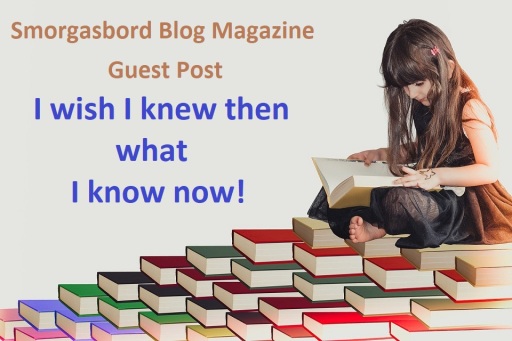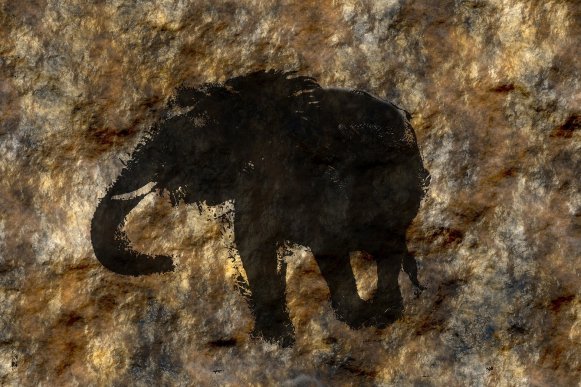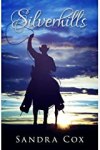
I am sure like me, there have been times when you have wondered what difference might have been made to your life, if your younger self had been gifted with the experience and knowledge you have accumulated over the years.
I invited several friends from the writing community to share their thoughts on this subject which I am sure you will enjoy as much as I did.
Today author Sandra Cox relives those days of manual typewriters and correction fluid that made creating a manuscript so interesting, especially when you needed to correct a paragraph halfway through the book!. Not to mention the snail mail approach to getting a publisher!
I Wish I Knew Then What I Know Now! by Sandra Cox

This is a bit of a tough one because I began writing in pre-historic times, when dinosaurs roamed the earth and writers pecked on typewriters. I had no idea computers, software, hardware, printers and emails were waiting in the future.
One morning I woke to birds chirping and mammoths trumpeting and decided I wanted to be a writer. Except for a few well-received essays in high school and a handful of English courses in college, I had absolutely no background in writing. I didn’t even know what a thesaurus was. I just knew I enjoyed creating stories.

The one thing I did have in my empty toolbox was a knowledge of books. I loved reading. I was a voracious reader. And while voracious may not work anymore to describe my reading, I still plow through several books a month. How can anyone not read? But I’m getting off topic. So armed with my ideas I began to write. This was challenging on a couple of levels. Creating a story and getting it on paper.
Today creativity is my major challenge. Then, getting words on paper.
Each typed page needed to be proofed before it left the typewriter and, unless you were a perfect typist which I wasn’t, involved a lot of white paint—correction fluid—from a little bottle called Wite.Out. Wite.Out was a secretary’s and writer’s best friend. Yes, back in the dark ages people were called secretaries instead of admin assists.
After typing out the manuscript, which usually involved several hundred pages, came the rewrites. Say you did a serious change on page ten that involved adding a scene or scenes that ran into extra pages. If you were lucky, you only had to retype that chapter then go back and use your trusty Wite.Out to change the following page numbers of the rest of your manuscript. Yup, the good ole days.
Next step was finding a home for your story. Again, there was no computer to do a quick search of who wanted what. The Writer’s Market Guide was, and probably still is for those who don’t publish Indie, an invaluable tool. I spent hours combing through pages looking for the appropriate home for my genre.
After I drew up a list, I began to send out my stories. Remember this was still the ice age, and typewriters and carbon paper still roamed the earth. There were no emails, no attaching three chapters and hitting the send button. Instead, it was purchasing legal size envelopes, stuffing your letter and chapters inside and heading for the post office. Then waiting, and waiting, and waiting some more, for a response that sometimes never came.
In that respect, things haven’t changed, have they? Often times when you did get a response, it was a form rejection letter—something else that I imagine hasn’t changed—and you started back at square one. Other times, the publishing company or agent wanted to see the entire manuscript. Then it was off to the supply store to buy a box to mail your manuscript in and have copies made. It was a fairly pricey and time-consuming process.
Researching was also more challenging than it is now. The information was there, but not at your finger -tips. Instead of tapping a few keys and doing a search, you had to track down physical books, which usually meant hitting the library or a bookstore.
And there was no self-publishing unless you went vanity and paid for it.
Since those days I have added to my toolbox and am always on the lookout for new tools. I have a few that I’d like to share, which you may already know of and use.
For synonyms, I use. Power Thesaurus
For covers: Pixel Studio I love this group. They are so helpful and their prices are unbelievably reasonable.
For those of you who make your own covers, trailers and or memes: Bookbrush
AND For general information and support for most aspects of writing and publishing, IWSG Insecure Writers Support Group.

So, back to the beginning: If I’d known then what I know now, I would have probably waited a few years to start writing.😉
©Sandra Cox 2022
My thanks to Sandra for this entertaining retro perspective of publishing before word processing dispensed with the services of typex and the like… having experienced similar frustrations, I am sure many of you who are of a similar age will relate.. for those who never experienced the joys of manual typewriters then I am sure it reads like a horror story lol… I know Sandra would love to hear from you.

About Sandra Cox
Sandra is a vegetarian, animal lover and avid gardener. She lives with her husband, their dog and several cats in sunny North Carolina.
Her novels consist of All Things Western and More. She is an Eppie finalist, award winner and category best-seller.
A small selection of Sandra’s books










One of the reviews for Mateo’s Blood Brother – Sandra’s latest release
You may have read Sandra Cox’s Mateo’s Law. After badgering Sandra for a year, she finally published the sequel to this paranormal police mystery called Mateo’s Blood Brother. It’s one of those books where you read the first line…
“A shadow fell across the desk. Unexpected. Eerie in the predawn gloom. Nerves thrumming…”
…and go make another pot of coffee because you know you’re going to be up all night.
I made a big mistake starting it at 7 pm.
Mateo’s Blood Brother (2022) opens with wolves howling. To Sheriff Mateo Grey, sheriff of a sparsely populated county in Montana and a shapeshifter, that could be real wolves or it could be his father or a former girlfriend, Delilah–both also shapeshifters. His father is fine but he tried to kill Delilah so she’s probably mad at him.
Mateo has finally found the perfect woman and they are engaged. She knows about his special skills and he’s made amends with his childhood friend, Jesse, Chief of Police of the Blackfeet Nation. Mateo’s life is as good now as its ever been, but his wolf instinct tells him he’d better solve the ‘issue’ with Delilah before really calling his life settled. No doubt she wants revenge for breaking up with her and then pushing her off a cliff, and Delilah has a nasty temper, one that will spill over to Mateo’s best friend Jesse and everyone else Mateo loves. Once Delilah’s attacks start–and they do–it takes more than just Mateo and Jesse to stop her, but luckily, they have friends they didn’t know about and some they hadn’t counted on. Even then, to survive takes a special tool they hadn’t expected to ever use.
If you love your modern westerns infused with native strength, paranormal excitement, and wolves, you’ve found your book. And the cover says everything you need to know about the cunning, majesty, and intrigue of wolves.
Read the reviews and buy the books : Amazon UK –And: Amazon US- follow Sandra Cox: Goodreads – Blog: Sandra Cox Blogspot – Twitter:@Sandra_Cox
Thanks for dropping in today and it would be great if you could share Sandra’s retro look at publishing…thanks Sally.

Pingback: Smorgasbord Blog Magazine – I Wish I Knew Then What I Know Now! – Guest Round Up – Part Two – D.G. Kaye, Sandra Cox, Roberta Eaton Cheadle, Stevie Turner, Dorothy Grover-Read, Terry Tyler, Alex Craigie, Jacqui Murray, D.L. Finn, Re
Oh, I also remember the typewriters, carbon copies, Typex… Although I was mostly writing for myself, it was very hard, and I did try sending a few short stories, and that was laborious enough already. So much easier today! Thanks for the memories, Sandra!
LikeLiked by 1 person
Thanks Olga ♥
LikeLike
Pingback: Smorgasbord Blog Magazine – Weekly Round Up – 30th May – 5th June 2022 – Home Renovations, Hits 1996, Summer Book Fair, Shortstories, Reviews, Blogger Weekly, Health and Humour | Smorgasbord Blog Magazine
Smile….how happy am I that I never opted for “office life” in my early years although I do remember how early research was confined to reference books and spent many happy hours for my homework in libraries…lovely post I am loving this series Sally 🙂 x
LikeLiked by 1 person
Thanks very much Carol.. fascinating insights into interesting lives..♥
LikeLike
Absolutely! 💕
LikeLiked by 1 person
It’s interesting for as much as things have changed, many remain the same. I suspect that people will always like stories; however, people write and read them.
LikeLike
FYI: I tried to respond to everyone, but some of my comments apparently took a different route and have gotten lost.
LikeLiked by 1 person
All restored Sandra…♥
LikeLike
♥
🙂
LikeLiked by 1 person
Thanks for letting me visit today, Sally:) I enjoyed it;)
LikeLiked by 1 person
Thanks for participating Sandra..super post ♥
LikeLike
Hi Sally, this is a very entertaining post from Sandra. I learned to type using an electronic typewriter so I know that white stuff which was called Tippex here. I came in a variety of colours for the carbon copies on different coloured paper. I don’t know if I would have had the tenacity to ever write a story as a part time writer under these conditions.
LikeLiked by 2 people
Hi Robbie, I did not know about the different colored Tippex.
I’m glad it’s all in the rearview mirror:)
LikeLiked by 2 people
Thanks Miriam.. I definitely would have lost the plot dealing with a manual typewriter and carbon copies..♥
LikeLiked by 1 person
A great response. Without the advent of computers, I would not have become a writer. I could not get the hang of typewriters and hated wite out. I also never learned to type properly and it is so much easier to do the two-finger typing on a computer.
LikeLiked by 1 person
Computers make everything easier, don’t they, Darlene? 🙂
LikeLiked by 2 people
Thanks Darlene..♥
LikeLiked by 1 person
Loved your last line, Sandra. It topped off your journey beautifully. I remember the typewriter days well, but it was journals that kept me going — volumes and volumes of handwritten journals. When I started to read them a few years ago, I was amazed by my tiny handwriting. Clearly, I had better eyesight back then!! 😊 Thank you, Sally, for spotlighting Sandra today. Loved it!
LikeLiked by 1 person
Thanks, Gwen:)
Better eyesight. Heh. I get that one.
LikeLiked by 1 person
Thanks Gwen.. ♥
LikeLike
Fun post, Sandra 🙂 I remember those days well. I recently found liquid correction hidden away in a desk drawer. I actually liked going to library to hunt down what I needed, but must admit it is certainly easier now to get questions answered. I haven’t parted with my old typewriter or postal scale for the days mailing into publishers. I don’t miss carbon paper though. Writing sure has changed and do have those lessons but the stories and reading will always captivate me.
LikeLiked by 2 people
Ack. Ack. Back liquid correction and typewriters. Back:)
Heh.
LikeLiked by 1 person
Thanks Denise..♥
LikeLike
I remember those days of wite out and carbon paper very well. And I was one of those secretaries. 🙂 I love this, Sandra. But even though you might have waited for better tools, the stories wouldn’t. 🙂 Thank you for sharing. Thank you, Sally, for hosting!
LikeLiked by 2 people
You’re right about the stories, Jan:)
LikeLiked by 1 person
Thanks Jan ♥
LikeLike
This all sounds soooo familiar, Sandra. I almost got queasy as you went through the challenges writers faced in the prehistoric days. Lol. I remember typewriters and carbon paper and correction fluid. And the cost of making copies and mailing. Fortunately I started my serious writing late in life, so computers took over quickly. A fun feature, my friend. Great share, Sally.
LikeLiked by 1 person
I understand about typewriters making you queasy. It’s a purrfect word for typewriter-response:)
Thanks:)
LikeLiked by 2 people
Ha ha ha. Your post made me want to hug my laptop and celebrate email. 🙂
LikeLiked by 1 person
LOL.
LikeLiked by 1 person
That last line, Sandra! Lol! Super cute take on the prompt! Thanks for sharing Sandra’s piece, Sally! 🙂
LikeLiked by 1 person
Thanks:)
LikeLiked by 1 person
Thanks, Yvette:) Appreciate that;)
LikeLiked by 1 person
Lovely post, so relatable!
LikeLiked by 2 people
Thanks Noelle. very much so..♥
LikeLiked by 1 person
Thanks, Noelle.
LikeLike
I can certainly relate to all of this! My first job as a newspaper reporter was covering the local news in our village and I typed everything up on an old (even for the time) Royal typewriter. Changing the ribbons resulted in black fingers for a couple of days! But I braved through, since I was earning 40 cents a column inch…
LikeLiked by 2 people
That was good money Dorothy and worth the stained fingers.. I think I wept the first time I used a word processor and could delete and backspace. xx
LikeLiked by 2 people
Yes, and move around paragraphs! Magic.
LikeLiked by 1 person
Ahh, good times:)
LikeLiked by 1 person
When our newspaper got its first computer system for the reporters, we had to transmit with a modem that we had to literally place the phone in a cradle. It made all kinds of noise, and took forever, but we were amazed that we were now in the new electronic world!
LikeLiked by 1 person
I actually rather liked the dial up noise… but it was slow..♥
LikeLiked by 1 person
God, we thought we were so cool, so cutting edge!
LikeLiked by 1 person
lol we still are Dorothy..♥
LikeLiked by 1 person
Well, yes we are Sally! Thanks for reminding me. I had to help a 20-something the other day figure out a glitch in her website!
LikeLiked by 1 person
Love it Dorothy… we’ve still got it lol.. ♥
LikeLiked by 1 person
This was so entertaining and ultimately useful! I also roamed with the mammoths and all of this is familiar to me. Even using a manual typewriter was a challenge compared with the ‘power-assisted’ ones that followed. Winding on a sheet at a time and hoping it was straight, having to use force to actually whack the keys to respond, jamming said keys by over-enthusiastic rushing and the nightmare of changing a ribbon. Tipp-Ex still exists but in pen form – not sure who uses it. Mine came in handy for creating snow on some miniature Christmas cards I made a few years ago…
I’m still in awe of the information on the Internet – doing history projects often involved ancient, dusty tomes that were hopelessly out of date.
I liked Michael’s comment that maybe the old way made us more reflective before we started writing.
Hugely grateful for the links to Power Thesaurus, Pixel Studio and Bookbrush and for another completely original take on Sally’s prompt. xx
LikeLiked by 1 person
Thanks Alex and glad to know Tippex is still alive and didn’t follow the dinasaurs into extinction.. even if it is for creating fake snow..♥
LikeLiked by 1 person
The power typewriters were a wondrous improvement weren’t they, Alex? Especially once they added the correction ribbons.
Still……..:)
LikeLiked by 1 person
I had a vision flash of my prized possession when I was a teenager., my manual typewriter. Love your logic, and your story and I celebrate your every success!
LikeLiked by 2 people
Thanks Annette ♥
LikeLiked by 1 person
Thanks, Annette. I shudder just thinking about manual typewriters:)
LikeLiked by 1 person
Oh the memories! This has me chuckling away in recognition. I have a pet dinosaur somewhere around here! 😂
Any research back in “the good ole days” meant two buses into the city centre, booking an appointment with the research librarian … couldn’t just turn up, and trying to find the right book/information in your allotted time. Then two more buses home.
We called Wite.Out “Typex”, and when it started getting old it got lumpy and messy!
I’m afraid I did cheat, Sandra. I hid in a Buddhist monastery until the age of computers, Bluetooth, and this magic thing called Internet! Lols. Then I poked my head out of the cave and started writing.
Wonderful share. Wishing you all the best. Hugs 💕🙂
Sally, thanks for sharing Sandra’s lovely post today. Hugs 💕🙂
LikeLiked by 2 people
Thanks Harmony and I wonder if the company who made Typex managed to transition when the need for it went out the window… ♥
LikeLiked by 1 person
Thanks, Harmony. Pet dinosaur. Hehe.
LikeLiked by 2 people
I enjoyed this post very much. It reminds me of the old days when I used to compose music – strictly on the piano, with sheet music paper and pencil. It’s amazing how things have changed. Great post, Sandra, and thanks for sharing. Hugs
Reblogged on Improvisation – “The Art of Living”
https://williampriceking.tumblr.com/
LikeLiked by 4 people
Thanks William and I can only imagine the freedom going digital offered you in terms of opportunity to create and instantly modify.. thanks for sharing on Tumblr hugsx
LikeLiked by 1 person
Thanks, William. And thanks for sharing how you composed music.
LikeLike
A great post, Sandra! It’s amazing to think about how things used to be done. Thanks for the tips. I just tried Power Thesaurus for the first time, and it was great. Toni x
LikeLiked by 3 people
Thanks Toni ♥
LikeLiked by 2 people
Power Thesaurus is great, isn’t it, Toni?
LikeLiked by 2 people
Another great post for this topic. Thanks for sharing
LikeLiked by 2 people
Thanks Sue xx
LikeLiked by 2 people
Thank you, Sue:)
LikeLike
Thank you, Sue.
LikeLike
I never had aspirations to write so my early experiences were notebooks and long hand.
You could cross through or just rip the page out.
My writing began as random poems and little stories for friends and family (including my toys).
But I remember ‘Typex’, and in my case ‘Snowpake’, which meant you could type over the offending error. Unless it was in long hand and a rubber would do.
As a draftswoman/tracer we had to be very precise in drawing and free hand text so definitely a rubber (good quality of course).
Later I did invest in a little typewriter for reports etc…
My story writing came later but then again I do have a few stories written that never went any further than just for me. Who know? One day.
But I still start in long hand.
LikeLiked by 3 people
Thanks Sue… of all my temp jobs the worst for was at a solicitor’s office. The man I worked for dictated all his work which included contracts, wills etc in triplicate and no Typex was allowed lol. Those who have never gone through the manual process don’t appreciate the bliss of backspace and delete button…xx
LikeLiked by 3 people
I hear ya on the long hand. I’ll still take a notebook to write down story thoughts if I’m in a ‘waiting’ area.
LikeLiked by 1 person
Yes, I alwaays scribble down my ideas in long hand.
but also then draft and when ready write up on the computer.
Long hand I just write; forget the spellings; forget the punctuation and certainly forget the neat writing…. just scribble. (Well sort of)
LikeLike
Oh, it does not sound very archaic, with the typewriter, White Out and carbon paper. I have saved some of this for worst times. 😉 Thanks for this wonderful story, and also the reminder on my adventure learning to type with ten fingers. Sometimes i think in the past were made more thoughts on words and sentences, before they came to paper. Best wishes, Michael
LikeLiked by 2 people
Thanks Michael.. my nightmare carbon copies with a mistake right a the end of the page lol.. hugsxx
LikeLiked by 1 person
Archaic is the purrfect word:)
LikeLiked by 1 person
Thanks! Sometimes some vocables like to stay in my mind. Lol xx Michael
LikeLiked by 1 person
Reblogged this on NEW BLOG HERE >> https:/BOOKS.ESLARN-NET.DE.
LikeLiked by 2 people
Thanks very much for sharing Michael..hugsx
LikeLiked by 1 person
Thanks, Michael.
LikeLike
Yes, I can relate!
LikeLiked by 3 people
Thanks Liz xx
LikeLiked by 2 people
The good ole days. Hack. Hack. Choke. Choke.
LikeLike
You’re welcome, Sally.
LikeLiked by 1 person
The more I read about Sandra, the more I wish we were neighbors. Great backstory on you, efriend! And I still stand by that review!
LikeLiked by 3 people
I agree Jacqui a lot of fun times I am sure..xx
LikeLiked by 2 people
I’m glad you are standing by the review:) Being neighbors would be a blast.
LikeLike
Great post from Sandra! Oh the memories of being an administrative assistant and the wite out and carbon paper days! LOL. And thanks Sandra for the tips on the services you use. I noticed Pixel Studios is Fiver? ❤
LikeLiked by 3 people
Nightmare days.. especially working in a solicitor’s office with contracts and wills where Typex was banned lol.. ♥
LikeLiked by 3 people
Oye! ❤
LikeLiked by 1 person
Thanks:) And yes, pixelstudio is on fiverr. I’m very happy with them, I’ve used them for several years.
LikeLike